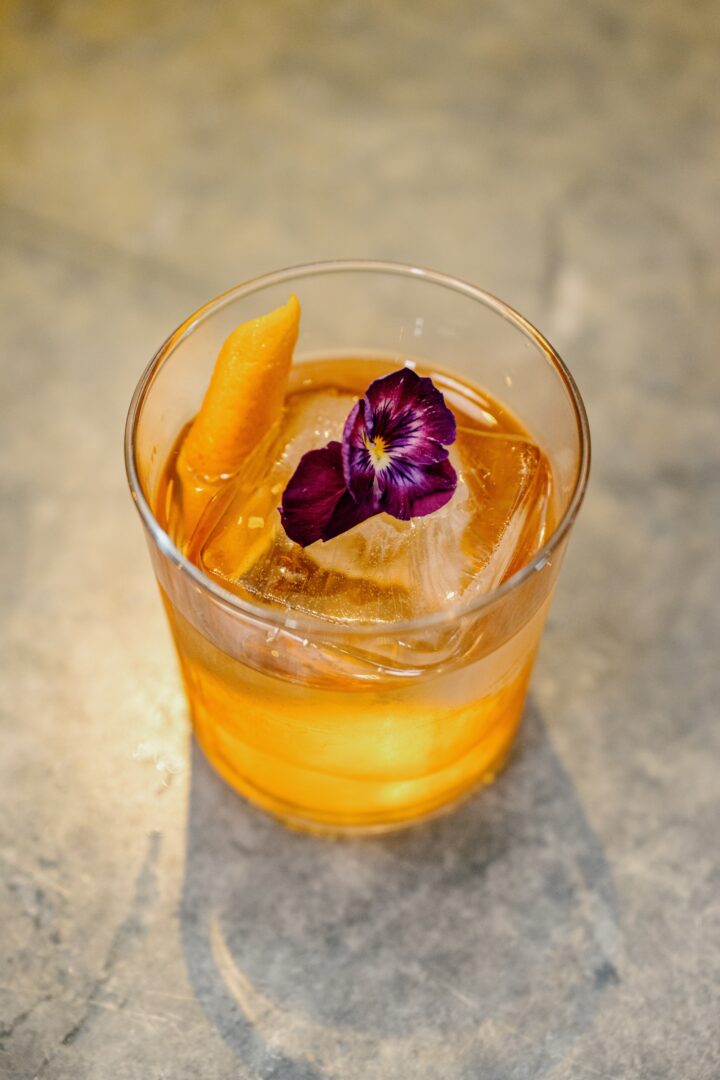
The worlds of drinks and food are colliding again behind the bar in a new and interesting way. Following the rising popularity of fat-washing—wherein bartenders use high-fat meat or oil to impart flavor into spirits—mixologists are now experimenting with rice using a similar, albeit simpler, washing technique. Rice washing is catching on for cocktail creators, especially in spirits-heavy drinks, and the results are notable. A quick rice bath adds starch to spirits and cocktails, making many spirits—from whiskies to rums to agave-based offerings—mellower and more palatable.
“Rice washing helps impart flavors, enrich spirits like whiskey, reduce that alcoholic sting and tannins, and offer a very smooth final product,” says Sulaiman Popal, the beverage manager at Washington, D.C. Afghan restaurant Lapis. “For us, it’s used in Old Fashioned variations to offer a richer flavor and take away much of the alcohol burn. We’re often able to convince those who don’t like Old Fashioneds or whiskey drinks to try our rice-washed one, and they end up liking it a lot.”
Popal does his rice wash sous vide style, and he prefers long-grain rice varieties because they have a lot of flavor with less starch. His bar recently offered an Advocaat-style cocktail called Mr. Lloyd ($18) made with Westward single malt, Pierre Ferrand 1840 Original Formula Cognac, egg yolk, vanilla syrup, and Afghan char masala mix comprised of cinnamon, cardamom, clove, and cumin. The bar rinses basmati rice and then heats it with the whiskey, Cognac, and char masala in a sous vide bag for 45 minutes, then strains the mixture and portions it off for use in cocktails. “It’s nowhere near as time consuming as other washing methods,” Popal notes.

In New York City, beverage consultant Leanne Favre has used rice washing in a variety of drinks, though her preferred technique is different. She builds the entire drink first and then rice-washes the full batched mixture before serving. Her Rosé Colored Glasses ($17) for Winona’s in Brooklyn, New York mixes Suntory Toki whisky with Lustau Rosé vermouth and Cappelletti aperitivo, washed with 2 tablespoons of short-grain sushi rice. She also made the Negroni de Nubes ($16) with bartenders Tom Macy and Shannon Ponche for Latin American bar Leyenda, also in Brooklyn. This drink mixes Derrumbes San Luis Potosí mezcal, Dolin Blanc vermouth, a house-made mix of strawberry-infused Suze liqueur and Cappelletti aperitivo, and saline, washed with rice.
“Washing with rice releases starches that contribute texture and a complex mouthfeel,” Favre says. “The technique creates a silky, rich texture and mouthfeel that’s almost creamy.” She prefers short-grain sushi rice because of its high starch content. “It’s an easy process,” Favre explains. “We batch the cocktail in full, then add the rice and stir until the batch becomes opaque, then strain. Rice washing can be paired with any whiskey, and other spirits like gin, mezcal, and Tequila.”
Rick Powanda, the head bartender at Bywater American Bistro in New Orleans, does his rice wash in yet another way. He washes just the base spirit with rice—and in a 4:1 ratio, so 1 cup of spirit to ¼ cup of rice—and he lets the rice bathe with the spirit for a longer time, sometimes overnight. “Rice is a wonderful way to soften whiskey while making the other flavors more harmonious,” Powanda says. “When using rice, I prefer to have it sit a little longer. I’m looking for more starch and a bigger mouthfeel. I want it to have a little more body.”
He’s offered a Whiskey Sour ($15) at Bywater made with rice-washed Wild Turkey 101, lemon juice, egg white, and house-made toasted rice syrup, as well as the Rice Mill Daiquiri ($15), made with a blend of Chairman’s Reserve Original and Spiced rums and Bounty White rum that have been rice-washed together and then mixed with toasted rice syrup and lime juice. He prefers to work with Jasmine rice because it imparts flavors of pandan, popcorn, and cereal, though he notes that Basmati rice also does well and provides nutty, spicy elements.
“Rice tames a spirit in the most beautiful of ways,” Powanda says. “The protein and starch add texture and body, especially the longer you leave the rice in. The starch softens the more spiked notes—be it bitterness, heat from the alcohol, or heavy notes from barrel aging—and it adds flavor and minerality.”